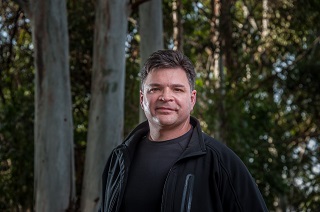Their research interests range from the genetic improvement of forest trees to the mole-rat queens of the Kalahari to life under rocks in Antarctica, but University of Pretoria (UP) Profs Zander Myburg, Nigel Bennett and Dr Thulani Makhalanyane have, after Thursday evening, something important in common: All three of them were winners of National Science and Technology Forum (NSTF)-BHP Billiton Awards.
A total of six UP researchers from a wide range of study fields were nominated for the 2014/2015 awards that annually honour and celebrate outstanding contributions to Science, Engineering, Technology and Innovation (SETI) in South Africa. The awards have been held in high esteem since its inception 17 years ago. Just being selected as a finalist is an honour in itself.
The three winners, all from the Faculty of Natural and Agricultural Sciences (NAS) at UP, were recognised for:
 Prof Nigel Bennett, Department of Zoology
Prof Nigel Bennett, Department of Zoology
Prof Bennett occupies the joint Department of Science and Technology (DST)/National Research Foundation (NRF) Research Chair in the field of Mammalian Behavioural Ecology and Physiology, as well as the UP Austin Roberts Chair of African Mammology. His research focus is ecology, animal physiology and behaviour using the African mole-rat as a model animal. He and his co-workers have investigated the ecological and physiological factors that affect the control of reproduction and the evolution of sociality in mole-rats, by adapting a multi-faceted approach.
Among other things, Prof Bennett’s research has shown that Damaraland mole-rat queens of the Kalahari are able to physiologically suppress the hormones that trigger ovulation and reproduction in so-called ‘worker females’ in the colony, and is currently trying to find out how this might occur. His research has set a benchmark for our understanding of reproductive success and social evolution in mammalian species, and his research record ranks him among the best researchers studying social regulation of reproduction in any group of mammals in the world.
Prof Bennet received a Research Capacity Development Award in recognition of his individual work over 5 to 10 years.
Prof Zander Myburg, Director: Forest Molecular Genetics Programme, Department of Genetics

Prof Myburg holds the Chair in Forest Genomics and Biotechnology and directs the Forest Molecular Genetics (FMG) Programme, a highly successful research venture started by UP, Sappi and Mondi in 2003. Together with his team, Prof Myburg’s work has focused on the genomics and molecular genetics of wood development in forest trees and, in particular, the genetic regulation of cellulose biosynthesis in Eucalyptus trees.
Under his leadership, the FMG research team has pioneered the use of population genomics and systems genetics approaches to unravel the genetic control of wood formation in Eucalyptus trees. Prof Myburg is the coordinator of the international Eucalyptus Genome Network (EUCAGEN) and was the lead investigator of the US Department of Energy (DOE) Eucalyptus Genome Project which last year resulted in the publication of the entire Eucalyptus genome sequence in the journal Nature.
Currently his work concerns the genetic improvement and engineering of forest trees to increase biomass and growth and enhance cell wall biopolymer properties for bio-based products.
Prof Myburg won a Special Photonics (named in celebration of Unesco’s International Year of Light and Light-based Technologies) TW Kambule Award in recognition for his research and its outputs as individual over the last 5 to 10 years.
Dr Thulani Makhalanyane, Researcher: Centre for Microbial Ecology & Genomics, Department of Genetics

Dr Makhalanyane, who serves as a Young Ambassador for the International Society for Microbial Ecology (ISME), is one of the UP’s top young scientists who has helped the University become a research leader in the study of extremophile organisms.
Before taking up a postdoctoral fellowship at the UP, he completed a BSc (Hons) degree in Microbiology at North West University and then moved to the University of the Western Cape where he earned both an MSc degree (obtained Cum laude, 2010) and a PhD (2013) at the Institute for Microbial Ecology and Genomics in the Department of Biotechnology in record time.
His research has focused on understanding the ecology of soil microbial communities in extreme environments, including hyper arid deserts like the Antarctic Dry Valleys and the Namib Desert. His work on unique organisms called Hypoliths, which create thriving communities below quartz rocks sheltered from extreme desert environments, aims to understand how they interact and take part in biological cycles such as carbon and nitrogen fixation.
He applies highly sophisticated techniques in his studies, including metagenomics and, more recently, metaproteomics and metabolomics. A number of publications in respected international journals (e.g. FEMS Microbiology Reviews, The ISME Journal, Molecular Ecology) were produced as a result. Dr Makhalanyane has presented his work at numerous international meetings and has also participated in various sampling expeditions.
Dr Makhalanyane won a TW Kambule Award for Emerging Researcher, recognising his post-doctoral research in the period after having been awarded a PhD.
 Prof Nigel Bennett, Department of Zoology
Prof Nigel Bennett, Department of Zoology Prof Myburg holds the Chair in Forest Genomics and Biotechnology and directs the Forest Molecular Genetics (FMG) Programme, a highly successful research venture started by UP, Sappi and Mondi in 2003. Together with his team, Prof Myburg’s work has focused on the genomics and molecular genetics of wood development in forest trees and, in particular, the genetic regulation of cellulose biosynthesis in Eucalyptus trees.
Prof Myburg holds the Chair in Forest Genomics and Biotechnology and directs the Forest Molecular Genetics (FMG) Programme, a highly successful research venture started by UP, Sappi and Mondi in 2003. Together with his team, Prof Myburg’s work has focused on the genomics and molecular genetics of wood development in forest trees and, in particular, the genetic regulation of cellulose biosynthesis in Eucalyptus trees. Dr Makhalanyane, who serves as a Young Ambassador for the International Society for Microbial Ecology (ISME), is one of the UP’s top young scientists who has helped the University become a research leader in the study of extremophile organisms.
Dr Makhalanyane, who serves as a Young Ambassador for the International Society for Microbial Ecology (ISME), is one of the UP’s top young scientists who has helped the University become a research leader in the study of extremophile organisms.
Get Social With Us
Download the UP Mobile App